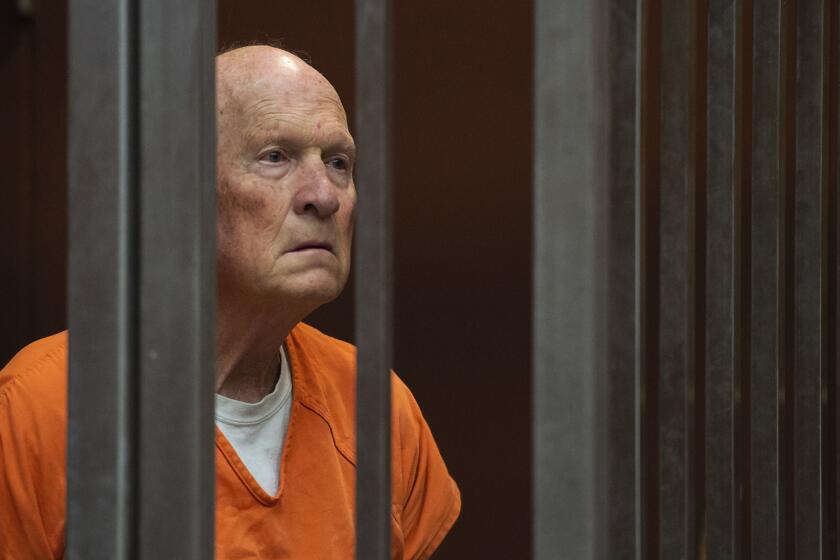A pyramid scheme seemed like a good idea — until one of the Bishop sisters was murdered

- Share via
Book Review
El Dorado Drive
By Megan Abbott
G.P. Putnam’s Sons: 368 pages, $30
If you buy books linked on our site, The Times may earn a commission from Bookshop.org, whose fees support independent bookstores.
Leave it to Megan Abbott to tap into the American zeitgeist and play on her readers’ fears like a conductor leading a doomsday orchestra. As high school and college graduates across the country celebrate the completion of a major milestone, they — and their nervous parents — are looking ahead to a future marked by political uncertainty and economic insecurity.
In an eerie echo, Abbott begins “El Dorado Drive,” her 11th novel, with a graduation party at the beginning of the Great Recession. Though the party is not a lavish affair — just a gathering for friends and family in the backyard of a rental property on El Dorado Drive in Grosse Pointe, Mich. — it’s more than Pam Bishop can afford, and every one of her guests knows it.
Any party, no matter how modest, reminds Pam and her two older sisters, Debra and Harper, of all that they’ve lost. Born into a world of wealth and privilege thanks to Detroit’s automotive-fueled postwar prosperity, the Bishop sisters — along with their parents, their peers and their children — watched it all disappear during the decline of the American automobile industry.
Pam’s ramshackle rental on El Dorado Drive, though several steps down from the home she grew up in or the mansion she moved into when she got married, is a symbol of the reckless pursuit of wealth that destroys those who can’t see through the illusion.
“When you grow up in comfort and it all falls away — and your parents with it — money isn’t about money,” Abbott writes. “It’s about security, freedom, independence, a promise of wholeness. All those fantasies, illusions. Money was rarely about money.”

For Pam’s ex-husband, Doug Sullivan, money is a game to be played in order to get what he wants, and he will stop at nothing to get it. But when Pam is brutally murdered in the opening pages, he emerges as a prime suspect. The first half of the novel backtracks from the discovery of Pam’s body to the graduation party nine months prior, when each Bishop sister is struggling with serious financial hardship.
Locked in an acrimonious divorce with no end in sight, Pam doesn’t know how she’s going to pay her son’s college tuition or handle her rebellious teenage daughter alone. The oldest sister, Debra, is buried under a mountain of medical bills while her husband suffers through another round of chemotherapy and her son slips away in a cloud of marijuana smoke. Harper, the middle child, struggles to make ends meet while rebounding from a relationship that ended in heartbreak.
Megan Abbott has made a career out of psychological thrillers involving women in competition. “Beware the Woman” takes a different — and timely — new turn
The solution to their money problems arrives in the form of a secret investment club called the Wheel. Run for and by women who have fallen on hard times, the program is simple but sketchy. It costs $5,000 to join, but once the new members recruit five new participants, they are “gifted” five times their initial buy-in.
If this sounds too good to be true, you have more sense than the Bishop sisters. Such is their desperation they don’t quite allow themselves to see this is a fairly basic pyramid scheme that depends on fresh blood — and their bank accounts — to keep the Wheel turning.
The novel follows Harper, the outsider in the family, due to the fact that she’s never married nor had children. She’s not part of the community, either, because she’s recently returned to Grosse Pointe after time away to mend her broken heart. The first half of the novel concerns the Bishops’ dynamics and their found family in the Wheel, which operates like a combination of a cult and a recovery group for women who’ve lost everything.
At a moment of vulnerability, Harper is buttonholed by an old classmate named Sue. “It’s called the Wheel because it never stops moving,” Sue said. Twice a month, we meet. A different member hosts each time, and the meetings were just parties, really. And at these parties, they took turns giving and receiving gifts to one another. To lift one another up. As women should, as they must.”
Behind the rhetoric of sisterhood lurks avarice and greed. When Harper asks Pam if anyone ever left the group after just one turn of the Wheel, Pam — a true believer — can’t fathom backing out of the group. “Why would anyone do that?” she asks.
The answer proves to be her undoing, and the second half of “El Dorado Drive” follows Harper as she tries to solve her sister’s murder. It’s a classic whodunit story with Harper — who has plenty of secrets of her own — playing the role of the reluctant detective.
Despite the book’s suggestive title, the landscape is anything but illusory for Abbott, who grew up in Grosse Pointe and spent the first 18 years of her life there. Evoking a rich setting has never been a weakness of Abbott’s stories. Her novels have a hyperreal quality and are often populated by characters churning with desires they cannot manage.
“Violent men unknown to me have occupied my mind all my adult life,” Michelle McNamara wrote in “I’ll Be Gone in the Dark: One Woman’s Obsessive Search for the Golden State Killer.”
Abbott is especially adept at rendering the hot, messy inner lives of young people and at making a book’s backstory as suspenseful as the narrative engine that drives the plot. In “El Dorado Drive,” however, the focus is on adults, and the past mostly stays in the past. The result is a novel in which the story is straightforward and the stakes are low. Nevertheless, true to her penchant for shocking violence, Abbott delivers a revolting revelation that sets up a series of twists that propels the story to its inevitable, but no less satisfying, conclusion.
But then there’s the matter of the Wheel. When we watch a video of people in a boat who are drinking, carrying on and disobeying the rules of the road, we don’t feel badly for them when they end up in the water, no matter how spectacular the crash, because they brought it on themselves.
The same logic applies to the participants in the Wheel. We can empathize with the calamities that prompted these characters to take such foolish chances, but we would never make those choices ourselves.
Or would we?
One could argue that our era will be defined not by whether the American dream lives or dies but by the questionable choices of our political leaders and, by extension, the people who elected them. We may not know where we’ll be tomorrow, but Abbott knows wagering that the wheel of grift, greed and corruption will keep on turning is always a safe bet.
Ruland is the author of the novel “Make It Stop” and the weekly Substack Message from the Underworld.
More to Read
Sign up for our Book Club newsletter
Get the latest news, events and more from the Los Angeles Times Book Club, and help us get L.A. reading and talking.
You may occasionally receive promotional content from the Los Angeles Times.












